新人教 初中英语--Unit 3 单元教案(英文)
- 格式:doc
- 大小:173.50 KB
- 文档页数:5
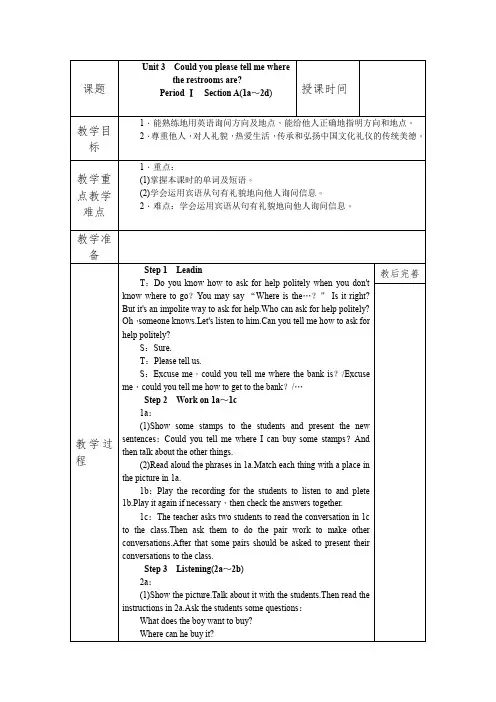
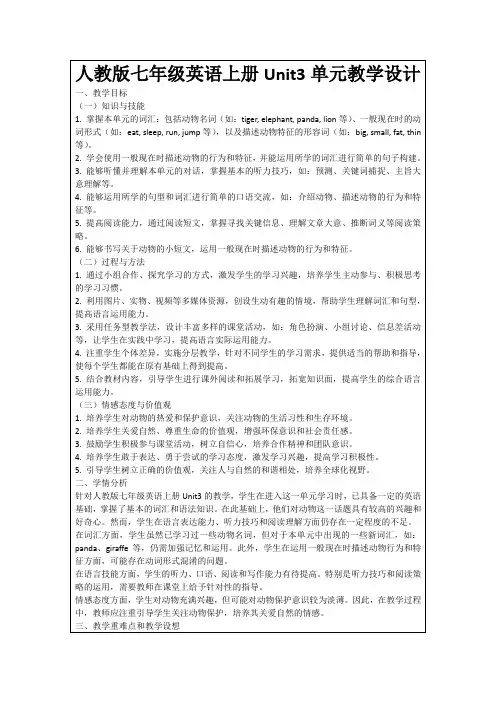
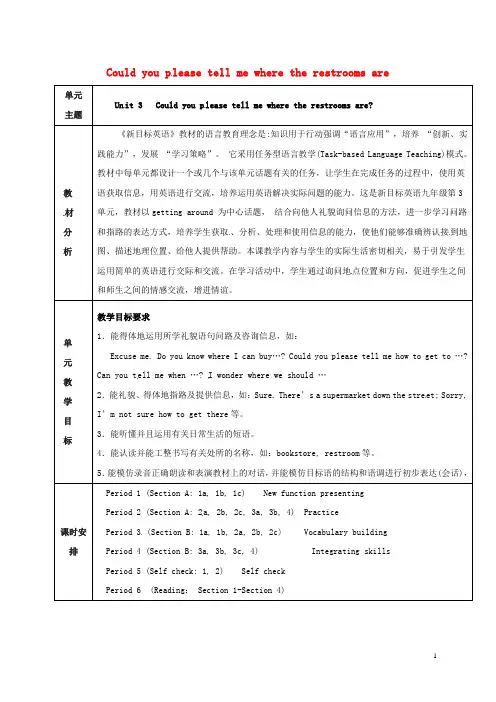
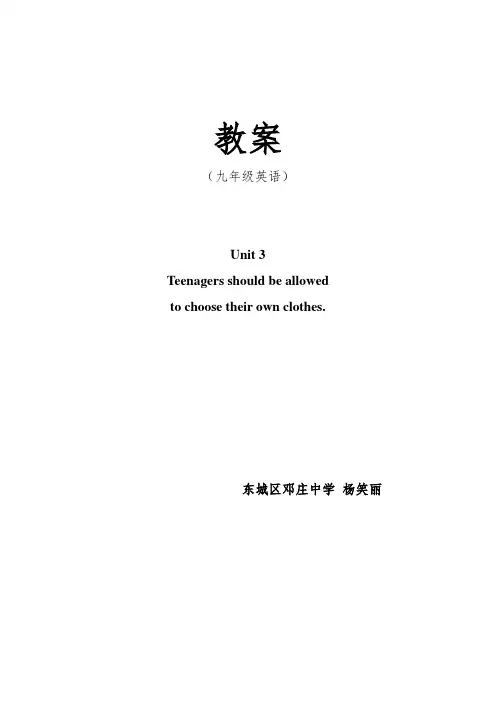
教案(九年级英语)Unit 3Teenagers should be allowedto choose their own clothes.东城区邓庄中学杨笑丽Unit 3Teenagers should be allowed to choose their own clothes.Section A【Teaching aims】nguage goals:A. Key words and phrases:allow, pierce, license, silly, earring, instead of, drive, driver’s license,B. Target language:——I think students should be allowed to do homework with friends.——I disagree. They talk instead of doing homework.——Do you think sixteen-year-olds should be allowed to choose their own clothes?——Yes, I do./No, I don’t.2. Ability goals:Students can learn to talk about what they are allowed to do. They also learn to agree and disagree.【Important points】——I think sixteen-year-olds should be allowed to drive.——I disagree. I think sixteen is too young.【Difficult points】Learn to talk about what they are allowed to do ; agree and disagree. 【Teaching methods】Scene teaching, activities teaching, task-based teaching method and so on. 【Teaching aids】A tape recorder, a little blackboard, pictures, CAI and so on.【Teaching procedures】Warm-up:1、show some pictures about a few activities,go out at night, surf the Internet, play basketball, drive a car, have part-time jobs...What do you usually do after school?Can you surf the Internet at home after school?2、Let students talk about what he/she can do or what he/she can’t do at home and show “can do” /”can’t do”.can do can’t doplay basketball surf the Internet……Presentation:1、Introduce the new structure:be allowed to doCross out the headings and write these headings in their place: “is allowed to”and”isn’t allowed to”. Say each sentence first with “can do “or “can’t do”, then with“is allowed to”or “isn’t allowed to”, and ask students to repeat each one.is allowed to isn’t allowed toplay basketball surf the Internet……S: Mike can play basketball at home, that means he is allowed to play basketball at home……Let the students practice with all items on the lists.2、Read the instructions in1a to the class.Say: all the sentences are things students are or are not allowed to do.Then read each item to the class. Ask students to explain what each sentence means in their own words:When students have explained all the items, ask students to circle A for agree or D for disagree for each item.Raise your hand if you circled A. Write the total of As and Ds for each item and discuss the results with the class.3、Read the instructions in1b to the class.Say: you will hear a conversation between Anna and her mother. They don’t agree about everything.Play the recording two times, and then check the answers:4、Use the statements in 1a to make conversations like this:A: I don’t think sixteen-year-olds should be allowed to drive.B: I agree, they aren’t serious enough.5、Point to the picture of 2a and ask students to say something about it.What is the boy doing?What are the girls doing?Read the instructions and point to the sentences. Ask a student to do it.Then point to the list of responses: Agree, Disagrees, and Doesn’t know.You’ll hear two girls having a conversation. Kathy will make some statements. Listen to what Kathy says and see if Molly agrees, disagrees, or doesn’t know what she thinks.Play the recording and then check the answers.6、Read the instructions in 2b and point to the list of reasons from the conversation. Ask different students to read the sentences to the class.Say: you will hear the same recording again. This time please number these reasons in the order you hear them on the recording.Point the sample answer.Say: Young people need to sleep is the first reason you will hear on the recording.Play the recording and then check the answers.7、Read the instructions in 2c to the class.Point to the sample conversation in the box. Ask two students to read it to the class.For example:A: Do you think teenagers should be allowed to get their ears pierced?B: Yes, I do. / No, I don’t.Consolidation and extension:Say: you can look back at activities 1a and 2a to get ideas for your list.Ask students for suggestions for their lists and write some of their statements on the board.For example:go out at night, have part-time jobs, smoke, surf the Internet, play basketball, get their ears pierced, drive, watch TVNext give students five minutes to make their own lists.Then ask students to work in pairs and discuss their lists.Ask one or two pairs to present their conversations to the class.Homework:1、Review grammar focus.2、List some other things about what they can do or can’t do using the structure “be allowed to”Blackboard Design:Unit 3Teenagers should be allowed to choose their own clothes.Section AHe is allowed to play basketball at home.He is n’t allowed to surf the Internet.Teenagers should be allowed to get their ears pierced.Teenagers shouldn’t be allowed to work on school nights.be ( not ) allowed to doshould ( not ) be allowed to doget something done / have something donenot calm enoughinstead of。
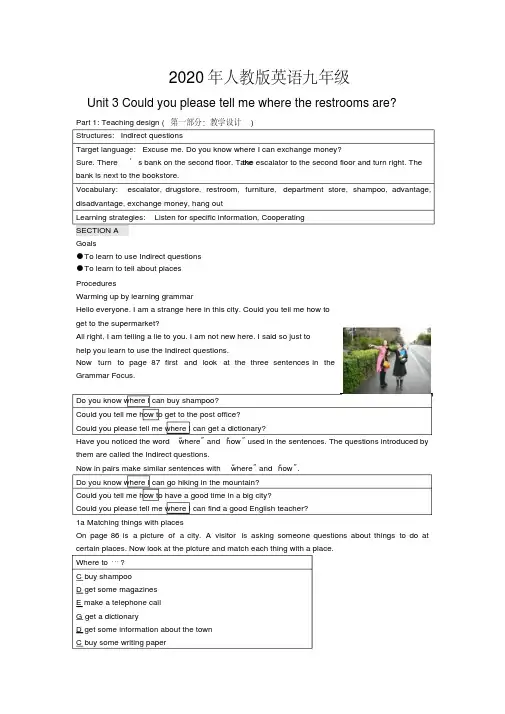
2020年人教版英语九年级Unit 3 Could you please tell me where the restrooms are?Part 1: Teaching design (第一部分:教学设计)Structures: Indirect questionsTarget language: Excuse me. Do you know where I can exchange money?Sure. There’s bank on the second floor. Takethe escalator to the second floor and turn right. The bank is next to the bookstore.Vocabulary: escalator, drugstore, restroom, furniture, department store, shampoo, advantage, disadvantage, exchange money, hang outLearning strategies: Listen for specific information, CooperatingSECTION AGoals●To learn to use Indirect questions●To learn to tell about placesProceduresWarming up by learning grammarHello everyone. I am a strange here in this city. Could you tell me how toget to the supermarket?All right, I am telling a lie to you. I am not new here. I said so just tohelp you learn to use the Indirect questions.Now turn to page 87 first and look at the three sentences in theGrammar Focus.Do you know where I can buy shampoo?Could you tell me how to get to the post office?Could you please tell me where I can get a dictionary?Have you noticed the word “where” and “how” used in the sentences. The questions introduced by them are called the Indirect questions.Now in pairs make similar sentences with “where” and “how”.Do you know where I can go hiking in the mountain?Could you tell me how to have a good time in a big city?Could you please tell me where I can find a good English teacher?1a Matching things with placesOn page 86 is a picture of a city. A visitor is asking someone questions about things to do at certain places. Now look at the picture and match each thing with a place.Where to…?C buy shampooD get some magazinesE make a telephone callG get a dictionaryD get some information about the townC buy some writing paperE buy some stampsB save money1b Listening and completingIt is difficult to get around in a new place. Now listen to the recording and complete the dialoguein the picture on page 86.TapescriptConversation 1Girl1: Excuse me. Could you tell me where I can buy some stamps?Boy1: Yes. There’s a post office on Center Street.Girl1: Oh. Can you tell me where Center Street is?Boy1: Sure. Go past the bank. Center Street is on your right.Girl1: Thanks a lot.Boy1: No problem.Conversation 2Girl2: Excuse me. Do you know where I can save money?Boy2: Sure. There’s a bank on Main Street.Girl2: Oh. Could you please tell me how to get there?Boy2: Yes... Go straight ahead. The bank is on your left.Girl2: Thank you.Boy2: You’re welcome.Write your words here in the speech bubbles.A: Could you tell me where I can buy some stamps?B: Yes. There’s a post office on Center Street.A: Excuse me. Do you know where I can save money?B: Sure. There’s a bank on Main Street.Read the tapescript and try to underline all the useful expressions used and circle the Indirect questions.1c Doing pairworkIn 1a there are many phrases describing activities. Now use them to make up conversations to talk about your own city. (The Indirect questions are circled.)A: Excuse me. Can you please tell me where I can buy shampoo in this city?B: Sure. There’s a department store over there.A: Excuse me. Can you please tell me where I can get some magazines?B: Sure. There’s a post office around the corner.A: Excuse me. Can you please tell me where I can make a telephone call?B: Sure. There’s a post office one hundred meters down the street.A: Excuse me. Can you please tell me where I can get some information about the town?B: Sure. There’s a library opposite of the hospital.A: Excuse me. Can you please tell me where I can get some writing paper?B: Sure. There’s a department store close to the bus station.A: Excuse me. Can you please tell me where I can buy some stamps?B: Sure. There’s a post office beside the library over there.A: Excuse me. Can you please tell me where I can save money.on the main library over there.B: Sure. There’s a big bank beside the café2a Listening and numberingDo you like shopping? If you do come and listen to the directions for going shopping around anew city.TapescriptBoy1:Excuse me. Can you tell me where I can buy some shampoo?Boy2:Yes. There’s a drug store on the second floor. Um. Let me think... Take the escalator to the second floor and then... then you turn left. Let’s see...Then go past the bank. And um... The drug store is between the furniture store and the bookstore. You should be able to get shampoo there.Boy1:OK, great. Thanks a lot.Boy2:You’re welcome.While listening please number the directions in the order that you hear them.Take the elevator to the second floor.2 Turn left.1 Take the escalator to the second floor.Turn right.4 The drugstore is between the furniture store and the bookstore.3 Go past the bank.Read the tapescript for the Indirect questions and the useful expressions. Circle the Indirect questions and underline the useful expressions.2b Listening and drawingDo you like drawing. Now listen to the recording again to draw a line on the picture on page 87 to show how the boy walks to the drugstore.2c Doing pairworkWhat else do like to buy? Then make conversations in pairs using the otherplaces in the picture on page 87.A: Excuse me. Do you know where I can exchange money?a bank on the second floor. Take the escalator to the second floor and turn right. B:Sure. There’sThe bank is next to the bookstore.A: Excuse me. Do you know where I can buy music CD?s a Music Magic shop on the first floor. Don’ttake the escalator. It is next to the B:Sure. There’escalator room.A: Excuse me. Do you know where I can get a dictionary?a bookstore on the second floor. Take the escalator to the second floor and turn B:Sure. There’sright. The bookstore is next to the bank.A: Excuse me. Do you know where I can buy some candies?B:Sure. There’s a drugstore on the second floor. Take the escalatorto the second floor and turn right. The bank is next to the bookstore.A:Excuse me. Do you know where I can buy a desk?a furniture store on the second floor. Take the escalator toB:Sure. There’sthe second floor and turn right. The bank is next to the drugstore.Now read aloud the conversations again to Circle the Indirect questions and underline the usefulexpressions.3a Reading and listingOn page 88 is an article about going to a mall. Now read it to list the advantages anddisadvantages of going to a mall. While you read, Circle the Indirect questions and underline theuseful expressions.They’re all at the mall.After school, a lot of young people go to the mall. We decidedto talk to some students about why they go there.Interviewer: Why do you go to the mall?Yu Yue: I go to the mall because my friends hang out there. But I don’t reallylike it.Interviewer: Oh? Why not?s usually crowded.t fresh. I prefer being outside. Also, it’Yu Yue: The air isn’Interviewer: And how about you?s always something happening. There are a lot of free concertsLi Jun: Oh, I love the mall. There’s also just fun to watch people.there. It’Hu Peng: I like the mall, too. I like to go in the music store and listen to CDs. I also like to look atbooks in the bookstore.Yu Yue: Well, when I go into stores I always spend too much money!Advantages disadvantagessh.There’s always something happening.The air isn’t freThere are a lot of free concerts there. It’s usually crowded.It’s also just fun to watch people.when I go into stores I always spend too muchmoney!I like to go in the music store and listen to CDs.I like to look at books in the bookstore.3b Doing groupworkWhere do you usually hang out with friends? What are the advantages and disadvantages ofhanging out at your house, at a mall or at your school? Now in groups talk about them.A: Where do you usually hang out with your friends?B: We usually go to my friend, Qiu’s place.A: Is that a good place to hang out?B:Well, it has advantages and disadvantages. It’s kind of small. But Qiu’s mom is a wonder cook, so we always have great snacks.A: Where do you usually hang out with your friends?B: We usually go to the bookstore.A: Is that a good place to hang out?B:Well, it has advantages and disadvantages. It’s very big and the air is fresh,too. And we can just read books there. We don’t have to buy books. So wealways have a good time there.A: Where do you usually hang out with your friends at weekends?B: I usually stay at home.A: Is that a good place to hang out for the weekends?B: Well, it has advantages and disadvantages. My room is kind of small. But I have a computerthere. I go online reading and watching. It is a wonderful place. So I always hang in at home.4. Directions challengeNow we are going to challenge one another. Write directions from your school to three certain places. Read the directions to each other and guess the places.A: Go out the front door and take a right. Walk about three blocks. Go past the park, and turn leftonto Oak Street. Then it is the…?B: Then it is the bookstore.A: Go out the back door and take a left. Walk about two blocks. Go past the post office, and turnright onto Chang’an Street. Then it is the…?B: Then it is the Teachers College.A: Go out the side door and take a right. Walk about three blocks. Go past the bus station, and turnleft onto Flag Street. Then it is the…?B: Then it is the lake.Closing down by looking and sayingTo bring the period to an end let’s look at the picture and talk about things happening in it.SECTION BGoalsTo learn to talk about places in the cityTo learn to read about placesProceduresWarming up by thinking about How to ask for directions when travelingBEST PROCEDURE:◆Get the name and address of the place you wish to visit.◆Talk to the Hotel Manager or someone that can read and write. If they get weak looking, orthey hesitate to read, do not embarrass them, go to the next person. The probably cannot read.◆After you have found hopefully someone that speaks your language or English you can start toask questions...1a Putting wordsOn page 89 is a list of words and a box with places. Now go over them and put in words besidethe place, the most important quality words first.Places Qualities1. restroom Clean→safe→uncrowded2. museum Fascinating→interesting→beautiful3. restaurant Delicious→uncrowded→inexpensive4. park Big→interesting→clean5. subway Convenient→safe→6. mall Uncrowded→inexpensive→1b Doing pairworkYou are familiar with the words in 1a. Now use them to talk about your city.A: The Fine Arts Museum is really interesting.B:Yes, and it’s beautiful, too.A: The Computer Room is really big.B:Yes, and it’s convenient, too.A: The Dining Hall is really clean.B: Yes, and the food is cheep, too.A: The Bus Station is really safe.B:Yes, and it’s uncrowded, too.A: The Central Square is really fascinating.B: Yes, and it’s not far away, either.2a Listening and writingSome tourists are going around your city. They are asking about things. Now listen to them talking and write what they ask about.Conversation 1Boy1: Could you tell me where there’s a good place to eat?Clerk:Of course. There are a lot of good restaurants in Sunville. What kind offood are you looking for?Boy:Vegetarian.Clerk:I’d try Green Land. They have delicious salads.Conversation 2Girl: Do you know if there are any public restrooms around here?Clerk: Yes. You’ll find some at the corner of Market and Middle Streets.Girl: Ummm... are they clean?Clerk: Oh, yes. They’re very clean.Conversation 3Mother: Could you tell me if there is a good museum in Sunville?Clerk:Well, we have several. What kind of museums do you like—history? Science? A children’s museum?Father: How about history? I like history museums. They’re fascinating.Girl1: Oh, Dad! History museums are boring. Let’s go to a science museum.Boy2: Science? We always go to science museums. I don’t like science museums. I want to go to a children’s museum. They’re more fun.Girl2: Well I’m too old for a children’s museum. Why don’t we go to an art museum?Clerk:Why don’t you go to the computer museum? There are a lot of fun things for childrenthere. You can learn all about the history of computers, as well as learn about science.Family: That’s a great idea! Let’s go to the computer museum. How do we get there?Do you know what the tourists are asking about?The tourists ask about…Conversation 1 RestaurantsConversation 2 public restroomsConversation 3 a good museum2b Listening and writingNow you are to listen to the conversations for the second time. Listen for where the man says thetourists should go.The tourists should go to…Conversation 1 Green LandConversation 2 The corner of Market and Middle StreetsConversation 3 The computer museumTo make a better use of the listening exercise we shall go on to read the tapescripts. While youread, Circle the Indirect questions and underline the useful expressions.2c Doing pairworkFor fun and for learning let’s role play the conversations between the man and the tourists. Who will be the man? All right, it’s you, Zhao Hongtao.to eat?A:Can you tell me where there’s a good placeB: Of course. What kind of food do you like?A: I like vegetarian food.B: There are a lot of good restaurants in Sunville. Why not go to GreenLand. They have delicious salads.A: Can you tell me if there are any public restrooms around here?at the corner of Market and Middle Streets.B: Yes, there’s oneA: A re they clean?B: Oh, no. They’re very dirty.A: Could you tell me if there is a good museum in Sunville?computer museum at the corner? There are a lot of fun things for both children andB:There’s aparents.A: That’s a great place! Let’s go to the computer museum. How do we get there?B: Take Bus 11.3a Reading and fillingGo to page 90, please. Read the article on the left and fill in the charts on the right. While readingtry to underline all the useful expressions and circle all the connectivesEat, have fun and learn in Watertown!Watertown is a great place for the family to take a vacation.. A differentTeenagers will want to visit the world’s largest water slidesand eat at Uncle Bob’s. They haveevery night. Kids will enjoy the Clown City Caférock band plays at Uncle Bob’sorganized games and the staff dress up as clowns.a lot for parents in Watertown. If they love good food, they can find it at the Farmer’s There’s alsoMarket where the food is both delicious and cheap. While the children have fun, parents can takethe dance lessons on the beach. And everyone can learn something in Watertown. There are threemuseums!Teenagers love the Sports Museum and kids enjoy the Science Museum. Parents will spend many happy hours walking through the History Museum.After reading fill in the chart on page 90 on the right.Kids Teenagers ParentsEat Uncle Bob’sFarmer’s Market Have fun Clown City CaféWater slides Dance lessonsLearn Science Museum Sports Museum History Museum3b Completing a tour guideOn page 90 is an unfinished tour guide to Sunville. Now turn back to 2a and 2b for information to finish it.SUNVILLE has something for everyone. If you’re looking for museums,you will find several here. History museums are fascinating to parents.But kids may find them boring. In a science museum you can learn lots ofthings. Children’s museums are more fun. An art museum is interesting topeople who like arts. If you go to the computer museum you will find alot of fun things for children there. They can learn all about the history ofcomputers, as well as learn about science.IN SUNVILLE there are a lot of good restaurants, too. They are nice places to eat. You can find vegetarian food and meats, too. Green Landoffers delicious salads.Public restrooms around SUNVILLE are clean and beautiful. You’ll find some easily at the corner of Market and Middle Streets.3c Write a guide to your city or townMY HOMETOWN: TAIYUANTaiyuan, the capital city of Shanxi Province, lies in the north basin of Middle Jin (Jin is another name for Shanxi Province) and crosses the River Fen. The city area administers three districts,one subdivided city and five counties. The history of the city can be traced back to over 2,400 years ago. It was established in 497 BC, the end of the Spring and Autumn Period (the slavery Period in China) and was named Jinyang, the northern bank of the Jin River. In Chinese, the northern bank of waters is called yang. In 982, Song Taizong, Zhao Kuangyi, the second emperorof the Song Dynasty burned and flooded Jinyuan City. After that, he ordered one of the officials,Pan Mei to build Taiyuan City in Tangming Town, north of Jinyuan City. Thus, came the present Taiyuan City. Taiyuan, in Chinese, means the greatest plain. In fact, it is dominated by rugged hills and hilly areas. Only one-fifth of the whole area is plains. Taiyuan is surrounded by mountains inthe east, west and north; only the southern part is alluvial plains. Taiyuan abounds in various minerals, especially coal and iron, so honors the name, "the home of coal and iron." Taiyuan is of continental climate at temperate zone. It is dry and cold in winter, hot and rainy in summer, dusty and windy in spring, cool and comfortable in autumn. The annual averagetemperature is 9.5 Degree Celcius.4 Doing groupworkOne of the group member is to role play the information booth worker, and theothers are the tourists. The tourists are asking about your city.Tourist: What is Taiyuan?Information booth worker: It is the capital city of Shanxi Province.Tourist: Where is Taiyuan?Information booth worker: It lies in the north basin of Middle Jin (Jin is another name for Shanxi Province) and crosses the River Fen.Tourist: How many districts are there in Taiyuan?Information booth worker: The city area administers three districts, one subdivided city and five counties.Tourist: How old is the city?Information booth worker: The history of the city is as old as 2,400 years. It was established in 497 BC, the end of the Spring and Autumn Period (the slavery Period in China). What was its old name?Tourist:Information booth worker: It was named Jinyang, the northern bank of the Jin River. In Chinese, the northern bank of waters is called yang.…Closing down by going around TaiyuanAt the end of the period I will take you on a trip to Taiyuan. Come with me.SELF CHECK1 Fill in blanks with the correct word given in its correct form.Beautiful, safe, delicious, convenient, fascinatingconvenient.1.I live right next to a supermarket. It’s very2.I find stamps fascinating. I’ve been collecting them for many years.delicious.3.Mr Tan makes the best noodles in town. They’re4.Put your wallet in a safe place.2. Looking and writingThere is a map on page 91 in the middle. Look at it and ask five questions. Answer them as a local person might do.s between the Fifth Avenuet and the 1.Excuse me, could you tell me where the bank is?→It’Garden Road on the west side of the Central Street.s at the corner of the Fifth 2.Excuse me, could you tell me where the movie theatre is?→It’Avenue and the Central Street. You can find it on your right.3.Excuse me, could you tell me where the restaurant is?→There are three restaurants in thes between the Fifth Avenue and the Road, just by the city. The best one is nearest from here. It’Central Street.s at the west end of the Garden Road 4.Excuse me, could you tell me where the library is?→It’opposite to the best restaurant in the city.5.Excuse me, could you tell me where the shopping mall is?→It’s the tallest building in the city.s located west of the Central Street between the Fifth Avenue and the Garden Road.It’Just for fun!Reading poems is fun. So go on reading this little poem by James Whitcomb Riley (1849-1916).A BOY'S MOTHERMY mother she's so good to me,Ef I was good as I could be,I couldn't be as good—no, sir!—Can't any boy be good as her!She loves me when I'm glad er sad;She loves me when I'm good er bad;An', what's a funniest thing, she saysShe loves me when she punishes.I don't like her to punish me.—That don't hurt,—but it hurts to seeHer cryin'.—Nen I cry; an' nenWe both cry an' be good again.She loves me when she cuts an' sewsMy little cloak an' Sund'y clothes;An' when my Pa comes home to tea,She loves him most as much as me.She laughs an' tells him all I said,An' grabs me up an' pats my head;An' I hug her, an' hug my PaAn' love him purt' nigh as much as as Ma.Reading: Could you please lend me your pen?Before you read, listen to the recording for the general idea of the passage.While you read, underline all the expressions and circle all the connectives.Asking for information or help is a very common and necessary activity, especially when we visita foreign country, so knowing how to ask for information politely is important. In English,where the restrooms are?” are similar “Where are the restrooms?” and “Could you please tell meuse correct requests — both are correct English, but the first could sound rude. It’s important tolanguage, but sometimes this alone is not enough— we need to learn how to be polite when wemake requests.In English, just like in Chinese, we change the way we speak when talking with different people.The expressions you use might depend on whom you are speaking to or how well you know them.If you said to your teacher, “Where is my book?”, this mightsound rude. But if you said, “Excusesound much more polite. Onme, Mr West. Do you k now where my book is?”, your question willin some situations, perhaps withthe other hand, it might be all right to say “Where is my book?” peopleyou know well.A very direct order like this can soundAnd you would not usually say, “Peter, lend me your pen.” rude in English. Usually in English polite questions are longer and include extra language such assounds more polite to say, “Peter, could you please lend ‘Could you please…?’ or ‘Can I ask…?’ Its, we might even need to spend some time leading in to a question orme your pen?” Sometimerequest. For example, if you stop a stranger in the street, we might first say, “Excuse me, I wonderbefore asking them for help.if you can help me” or “I’m sorry to trouble youbut,” It might seem that speaking politely is more difficult than being direct, and in a way this may betrue. However, in order not to offend people, learning about language etiquette is just as learning grammar or vocabulary. And doing this will also help you become better at English, or any other language you wish to speak.Part 2: Teaching Resources (第二部分:教学资源)I. How to ask for directionsWhen you don't know where you are, or when you don't knowhow to get to a place, you can ask directions. Talk to the firstperson that you see. Ask that person where you should go.I don't like maps. I prefer to just stop and ask directions.I think we're lost. Let's pull over and ask directions.II. How to ask politelyBAD GOODWhere are the corn chips? Could you tell me where the corn chips are,please?There's no milk left. Is there any more milk, (please)?How does this work? Can you show me how thisworks? (e.g. a coffee grinder)Slice it thicker/thinner. I'd like it sliced thicker/thinner, please.Give me a pound of that. Will you give me a pound of that, please?Can/could I have a pound of that, please?。
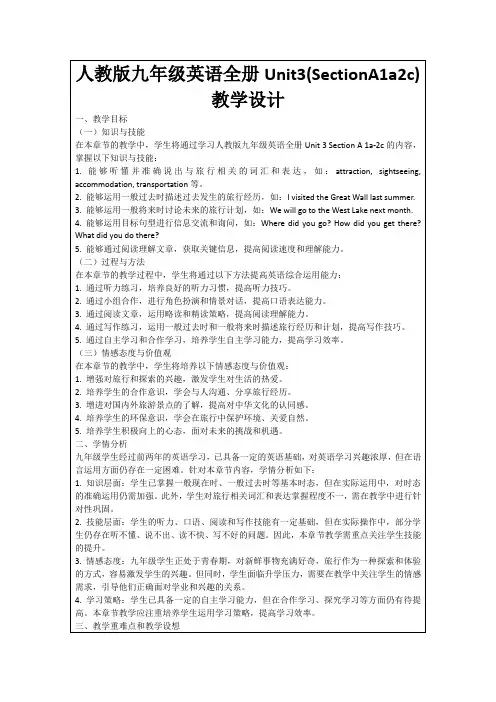
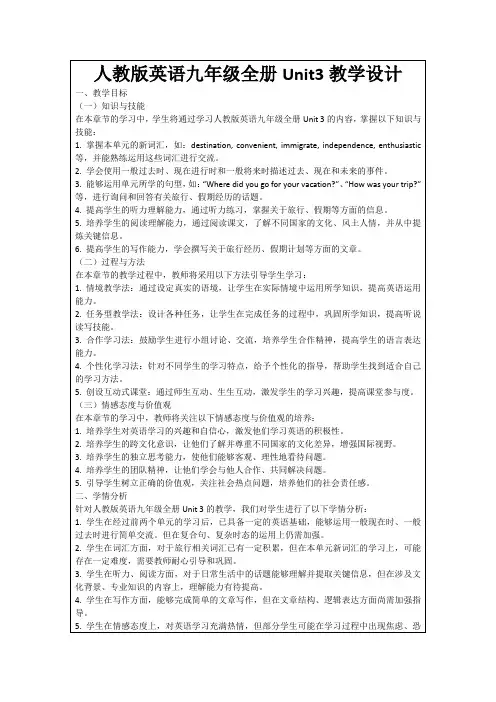
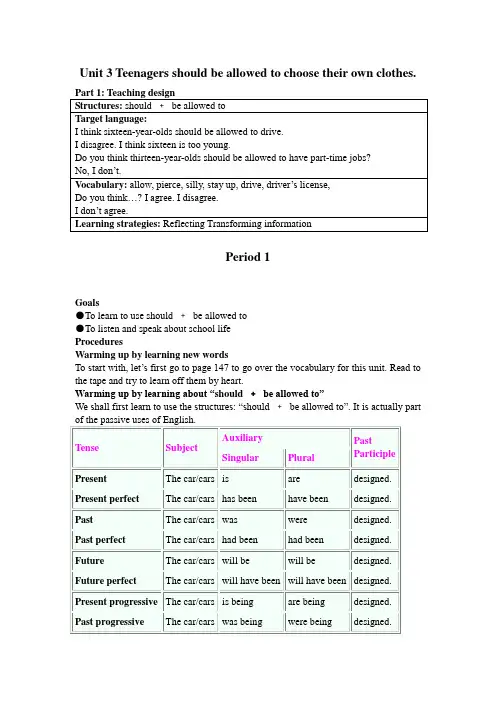
Unit 3 Teenagers should be allowed to choose their own clothes.Period 1Goals●To learn to use should ﹢be allowed to●To listen and speak about school lifeProceduresWarming up by learning new wordsTo start with, let’s first go to page 147 to go over the vocabulary for this unit. Read to the tape and try to learn off them by heart.Warming up by learning about “should ﹢be allowed to”We shall first learn to use the structures: “should ﹢be allowed to”. It is actually part“should ﹢be allowed to” can be used like this: He should be allowed to come. Animals should be allowed to live in the forest. Children should be allowed to watch TV at weekends.1a Reading and circlingFor practice of the “should ﹢be allowed to” r ead the statements in the box on page 18 and circle A for agree or D disagree.1b Listening and circlingListen and circle “T” for true or “F” for false beside the statements in the box on page 18.Now try to copy the expressions from the listening tapescript on the blackboardIn pairs look at the statements in activity 1a and makeconversation. You may use the phrases in the box on page 18A: I think teenagers should be allowed to go out with their friends.B: I agree. They are old enough.A: I think teenagers should be allowed to go to the mall with their classmates.A: I think teenagers should be allowed to get their driver’s license.A: I think teenagers should be allowed to drive.A: I think teenagers should be allowed to get their ears pierced.A:I think teenagers should be allowed to watch TV at weekends.A: I think teenagers should be allowed to take the school bus.A: I think teenagers should be allowed to buy a new blouse at the mallA: I think teenagers should be allowed to choose their own clothes.B: I agree. They are old/ clever/ strong/ bright/ serious/ kind/ careful/ lucky/ enough.Goals●To learn to use should ﹢be allowed to●To listen and speak about school life2a Listening and checkingNext we are going to listen and check on page 19 what Kathy thinks. You may circle “Agree”, “Disagree”, or “Doesn’t know” to show what Molly thinks.2b Listening and numberingYou are going to listen again to the recording just now tonumber Kathy’s and Molly’s reasons in the correct order onpage 19.Next you are going to make in pairs a list of things teenagersshould and should not be allowed to do. Discuss your listwith your partner.A: Do you think teenagers should be allowed to drive?B: Yes, I think so.A: Do you think teenagers should be allowed to work late at night?B:No, I don’t think so. I don’t think they should be allow ed to work late at night. They need to get enough sleep.A: Do you think teenagers should be allowed to disagree with their teachers?B: Yes, I think so.A: Do you think teenagers should be allowed to get tired doing their homework?B:No, I don’t think so.A: Do you think teenagers should be allowed to work every night?B: Yes, I think so.A: Do you think teenagers should be allowed to cut one’s hair?B: Yes, I think so. I kind of like my own style. It looks cool.A: Do you think teenagers should be allowed to have many friends?B:No, I don’t think so. They may meet bad people if they have too many friends.A: Do you think teenagers should be allowed to work on weekends?B: It depends on what they do. They may spend time with parents on weekends.Goals●To read about rules of school●To write about rules of school3a Reading and writingYou are to read a dialogue between Sun Fei and Wu Yu on page 20. After reading you shall write in the chart Sun Fei’s and WuYu’s rules. Use “Don’t…” and “You can” to express your ideas.In pairs role play the conversation in 3a using the information in the chart on page 20. A: What rules do you have at home?B:Well, I’m not allowed to go o ut on school nights. How about you?A:I’m not allowed to go out on school nights either. But I can watch TV with my sister.A: What rules do you have at school?B:Well, We’re not allowed to go out to movies on school nights. How about you?A:We’re not a llowed to go out to movies on school nights either. But We can watch VCD with our teachers on the school playground.4 Doing groupworkTurn to page 20 and find someone in your group who has to g o home after school, who is allowed to stay up until 11:00 pm, who has to stay at home on school nights, who is allowed to watch TV every night, who had to clean up his room every morning.Write their names in the chart on page 20Goals●To read about rules of school●To talk about rules of schoolProceduresWarming up by talking about rulesHello, class. Are there any rules for us in this class? What are they? How were they made?Now list some of them and talk about them in pairs.1a Reading and checkingRead the questions on page 21 and writ e either “A” for always, “U” for usually, “S”I am going to play a dialogue to you. It is between a man and a boy called Peter. They are talking about a math test. You are to listen and circle the things in activity 1a you hear. While listening try to note the expressions used.2b Listening and matchingListen again to the dialogue and match the sentence parts in the box on page 21.Now copy down the expressions from the dialogue into your notebook. They are shown on the blackboard.2c Doing group workPeriod 5Goals●To read about rules of school●To write about rules of school3a Reading and answeringNext it’s reading time. Let’s read the article on page 22 and answer the questions following it. Try to put the sentences into parts and underline the expressions.3b Doing pairworkRole play a conversation using information from 3a.A:I think our school rules of always wearing school uniforms at school should be changed.B: Well, Mary and I talked about the rules the other day.A: At our school, we have to wear uniforms every day. That is bad for us.B: Yes, I agree. The problem is that all of us think the uniforms are ugly.A: I think young people should look smart and so we should be allowed to wear our own clothes.B: But our teachers believe that if we did that, we would concentrate more on our clothes than our studies.A: I disagree with them. We would feel more comfortable and that is good for studying. If we can't do that, we should be allowed to design our own uniforms. That would be a good way to keep both teachers and us happy.B:It’s also probably a good idea for parents to allow us to study in groups during evening.A: I think so. I know we get noisy sometimes, but we learn a lot from each other.B: I also think that vacations should be longer.A: I agree with you on that. At present they're too short. Longer vacations would give us time to do things like volunteering.B: Last summer I had an opportunity to volunteer at the local hospital, but I couldn’t because I had to go back to schools. It would be a good experience for me because I want to be a doctor when I'm older.A:Let’s go to talk to our teachers about the school rules after school.B: OK! I agree with you!4 Making a list of rulesSuppose you and your friend are starting an English club. Make a list of rules aboutPeriod 6SELF CHECK1 Filling in blanksTo test your study this week you are to fill in each blank on page 23 with a correct word given. Change the form if it is necessary.2 Reading and writingYou are going to read the article on page 23 first and then write a letter to the editor agreeing or disagreeing. Explain your reasons.While you are reading cut the sentences into thought groups and underline the expressions.3. Helping and learningAt our school, we sometimes have a special day/ to help others. Last year/ we went to an old people’s home/ and sang songs/ and performed a play /for them. The old people were very happy. We should be allowed/ to take time/ to do things/ like that/ more often. For example, we should visit primary schools/ and help teach young students. I want to be a teacher/ when I'm older/ so it would be a great experience/ for me. Other students would like to do other jobs. For example, my friend Tian Ge wants/ to write for a newspaper. She should be allowed/ to volunteer/ at the newspaper office/ once a week. On Friday afternoons, many students are sleepy/ after a long week of classes. Some students should be allowed/ to have Friday afternoonsTo end this busy period we shall take time to learn and read aloud an English poem for kids.Reading: Should I be allowed to make my own decisions?Before you read, go over the new words for this part on 148.While you read, listen to the recording and underline all the expressions.Many teenagers have hobbies. But sometimes these hobbies can get in the way of schoolwork, and parents might worry about their child's success at school. Teenagers often think they should be allowed to practice their hobbies as much as they want. Do you agree?Liu Yu, a fifteen-year-old from Shandong, is a running star. He is in his school running team, and has always wanted to be a professional athlete. However, his parents won't allow him to train as much as he would like to. "Of course we want to see Liu Yu achieve his dreams,”says Mr Liu, “and we know how much he loves running. That's great, and my wife and I watched him in every one of his races. We have nothing against running! But we do think that our son needs to be realistic. Now he is getting older, he needs to think about what will happen if he doesn't become a professional runner in the end.”Liu Yu doesn't really agree. “Well, I think I should be allowed to make decisions for myself,”he s ays. “ My parents have always taught me the importance of working hard and not just to do what I enjoy. I understand this. But I'm serious about running. Being a professional runner is the only thing I have ever wanted to do.”Mr and Mrs Liu believe that Liu Yu should study hard in the evenings, and so they don't allow him to practice running on school nights. “I know this might seem strict,”says Mrs Liu, “but we think we're doing the right thing. He has to understand that very few people can become professional athletes. It's a very difficult dream to achieve. We don't allow him to practice every day because we think he needs to spend time on his homework.”But Liu Yu still doesn't agree. “I know my parents care about me,” he says. “But they are always talking about what will happen if I don't succeed. But I will succeed! I think I should be allowed to make this decision myself. Only then will I have a chance of achieving my dream.”After you read, read aloud the text again, to yourself, or to the tape and copy down all the expressions, too.。
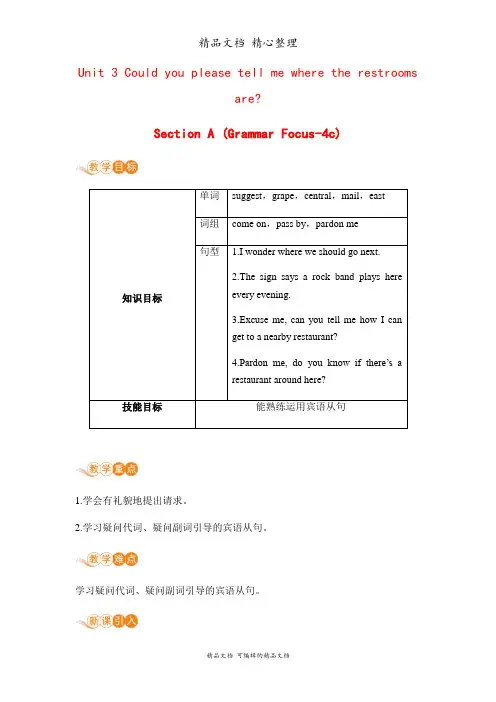
Unit 3 Could you please tell me where the restroomsare?Section A (Grammar Focus-4c)单词suggest,grape,central,mail,east1.学会有礼貌地提出请求。
2.学习疑问代词、疑问副词引导的宾语从句。
学习疑问代词、疑问副词引导的宾语从句。
Step 1复习:围绕某一个地点进行询问。
Excuse me, could you tell me where I can…how I can…if/whether there is…Step 2情景导入:T:Everyone may have been to some parks, Water World, and some zoos. Do you think they are fun? Have you been to Fun Times Parks? They’re really wonderful parks. Do you know about them?环节说明:本环节有助于调动学生的积极性,让学生有想了解Fun Times Parks的欲望,使学生的学习效果更佳。
Step 3完成教材Grammar Focus-4c中的任务:1.学生大声朗读Grammar Focus中的句子并熟记。
完成下面的表格。
Excuse me,do you know where I can buy some medicine?(打扰了,你知道我在哪里能买到一些药吗?)Sure. There’s a supermarket down the street.(当然。
沿着这条街有一个超市。
)Could you please tell me how to get to the post office?(你能告诉我怎样到达邮局吗?)Sorry,I’m not sure how to get there.(对不起,我不确定怎样去那儿。
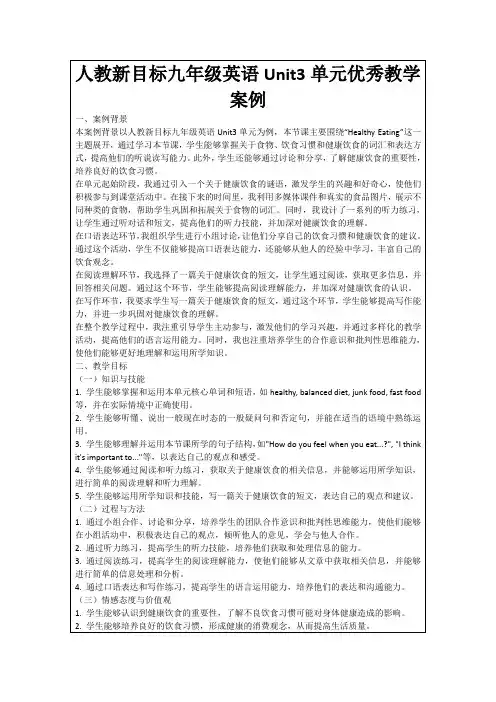
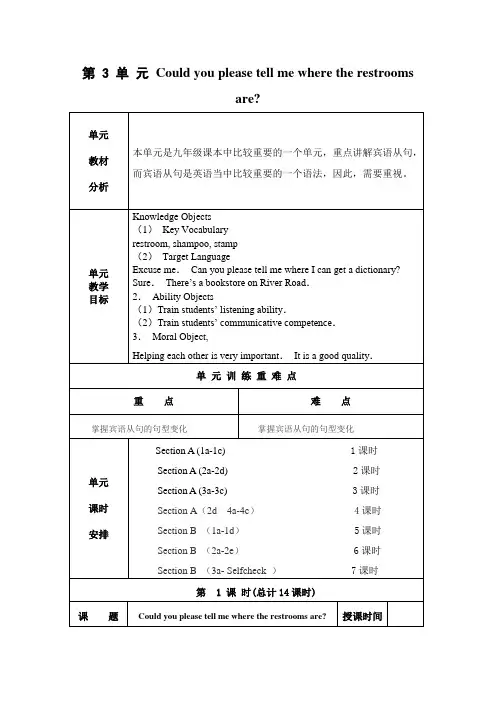
人教版新目标九年级英语Unit3 单元教案Unit 3 Could you please tell me where the restrooms are?Section A (1a -2d)学习目标1.重点单词:restroom ,stamp,bookstore ,beside ,postcard ,pardon,washroom,bathroom,normally ,rush2.重点短语:take out the rubbish ,fold your clothes ,sweep the floor ,make your bed ,go out for dinner ,get a ride 3.重点句式:—Could you please tell me how to get to the bookstore?—Just go along Main Street until you pass Center Street.—Do you know when the bookstore closes today?—It closes at 7 :00 p.m. today.Do you know where I can get some postcards?I don't mean a room for resting.学习重点1.重点短语和句型2.疑问代词、疑问副词引导的宾语从句学习难点疑问代词、疑问副词引导的宾语从句自主学习一、预习课本P17-18 新单词并背诵,完成下面的汉译英。
1.洗手间________ 2.邮票________________3.书店_________ 4. 在旁边________5.明信片________ 6. 抱歉 ________7.洗手间________ 8. 浴室 ________9.通常________ 10. 仓促_________二、认真预习1a-2d 找出下列短语和句型。
Unit 3 Can you spell it?一、教学目标与要求通过本单元教学,使学生初步掌握下面列出的日常交际用语和几个简装句型,并能用英语就一些简单的物体进行问答。
二、教学重点与难点1、日常用语(Greetings):1)How do you do?2)Good afternoon.3)Good-bye.4)Excuse me.5)Sorry.2、句型1)Can you spell your name,please?2)What's this in English?三、课时安排本单元共4课时,每课1课时。
第九课Lesson Nine一、教学内容1、句型:Excuse me!Are you…?2、日常交际用语:Good afternoon.2)How do you do?二、教具录音机三、课堂教学设计1、复习所学过的日常会话(参照第6课教案)。
唱字母歌。
2、请两组同学做"Can you say the ABC"的游戏。
3、复习数词“1~8”的读音,教数词“9”。
学生听懂即可。
4、复习Are you…?这个句型。
操练这个句型时,既可以用学生的真实姓名,也可以故意叫错学生的名字,以便让学生说出:S:No,I'm not. I'm …5、打开课本,教师利用书中图片介绍这一课的情景:一个叫Li Fen的年轻姑娘,到机场去接以前未见过面的格林先生(Mr Green).Li Fen在机场约好的地方等候,这时一位外宾走过来,Li Fen上前有礼貌地打招呼并询问对方。
放这一段录音,学生听两遍,借助图片理解这段对话的意思。
教师继续用汉语介绍情景的发展,并放下一段录音。
学生听两遍。
教师解释:How do you do ?的用法及应答方式。
重放这部分录音,学生跟读。
反复跟读几遍之后,教师可与学生(们)分角色把这段对话演练一次。
教师扮演Li Fen的角色;学生们扮演外宾的角色。
Unit 3 What would you like?
B Read and write
Robin will cook today.
Changgang Primary School Xu Jing
Ⅰ.The analysis of teaching contents:
This topic is from the third unit of PEP English book 5. Wu Yifan and his grandpa left 2 notes to Robin. Ss will know how to describe What they like and what they don’t like on the basis of the knowledge they have learned before. And they will learn more about how to write a note. Ⅱ.The analysis of Students:
The Ss are in grade 5.They have learnd English for 2 years, and they are active and interested in learning English. Food is one of the most interesting topic for them, and they are interested in some other delicious food. They want to express the food what they like and what they don’t like, So they will have more interested in this class.
Ⅲ. Teaching aims:
A. Knowledge aims:
Ss will understand and say the words of food.
Ss will understand and say the sentences : I don’t like …but …is OK./ I like …but not…
B. Skill aims:
To develop Ss’abilities of reading ,cooperations and
communications with others.
C. Emotion aims:
Ss will love their life and get more interests in learning English. Ⅳ.Teaching points:
A. Important points:
The understanding of the words about food and the sentences: My favourite food is. It’s/they’re…; I don’t like beef but chicken is OK; I like vegetables but not carrots.
B. Difficult points:
The writing of a note about what they like or don’t like.
Ⅴ. Teaching aims:
CAI, PPT and some pictures of food.
Ⅵ. Teaching methods:
TPR, situational teaching method, reading teaching methods.
Ⅶ. Teaching procedures:
Teaching
procedures
Teacher’s activities Ss’ activities purpose
Step 1
Pre-reading 1.Greetings.
2.Show Teacher’s pictures
and
free talk:
My favourite food is…
It’s /They’re…
3. Watch video: having a
picnic.
1. Say the words
about food quickly
2. Talk about their
favourite food.
3.Watch the
video.
用老师吃
汉堡的照
片复习食
物类单词
和句子。
激
活学生对
于food的
相关名词
和味觉相
关形容词
的印象。
并。